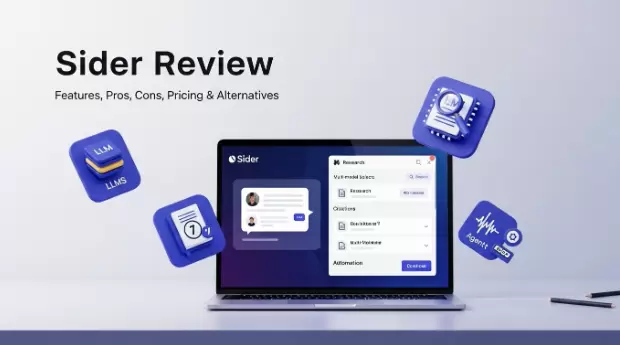Digital business cards have become a trend in networking because of its fast interaction sharing and real-time editing capabilities.
If you want to level up the networking game and develop lasting, deeper relationships, digital business cards are the way to go.
Professionals and businesses are shifting to digital business card systems to streamline networking, enhance brand exposure, and take advantage of cutting-edge features like QR codes, analytics, and interfaces.
Eco-friendly ease, easy sharing tools, and dynamic features including real-time updates and analytics abound from digital business cards.
Whether you’re a freelancer, entrepreneur, or part of an as big group, these tools can enhance your networking game.
Below, we’ve prepared a list of the best digital business card platforms you should consider, packed with notable features and details about each service.
What is a Digital Business Card?
A digital business card, also known as an electronic or virtual business card, is a digital replica of your physical business card that usually involves:
- Name and Photo
- Address
- User's bio
- Company Name
- Phone number
- Email Address
- Website URL
- Social Media Links
You can share your digital business card via URL or QR Code via email, social media platforms, Google Wallets, or a mobile app.
To receive your contact information, your clients or colleagues simply need to tap the proper link or scan the QR code.
Because of its cutting-edge features, that traditional paper business cards just are unable to match, digital business cards are being more and more popular.
Making the change from traditional to digital business cards is simple especially if you use tools that give a lot of flexibility.
What are the benefits of a digital business card?
Due to their modest size, traditional business cards require you to make choices about what information to provide.
A 3.5" x 2" card makes it nearly impossible to include several phone numbers, emails, URLs, and social network handles.
Thank goodness for digital business cards! They remove these restrictions, making it simple to communicate an infinite quantity of information. Recipients can view your information on their computers or mobile devices at any time, from any location.
An electronic business card allows you to include:
- All of your phone numbers
- Links to websites
- Social media accounts
- Location on Google Maps
- And a lot more!
Best Digital Business Cards in 2025
1. ZUMVU Business Card
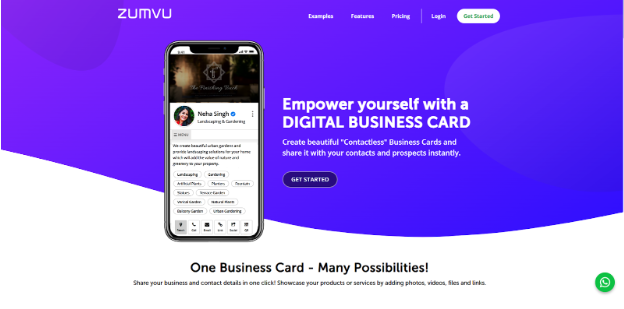
Zumvu positions itself as a sustainable, all-in-one digital business card solution designed for eco-conscious professionals and businesses. It combines sleek design with robust features like CRM integrations and carbon offset partnerships.
You can more effectively analyze engagement and adjust your strategy with Zumvu's insightful data on how recipients interact with your information.
Furthermore, the ability to build custom domains adds a level of professionalism, ensuring that your digital card is consistent with your personal or business branding.
Key Features:
- Choose from minimalist, modern designs or create a card from scratch.
- Share your card via QR code, NFC tap, or direct link.
- Sync contacts with Salesforce, HubSpot, and Microsoft Dynamics.
- Track views, location data, and engagement metrics.
- Add PayPal, Venmo, or Stripe buttons for seamless transactions.
2. Digital Business Card
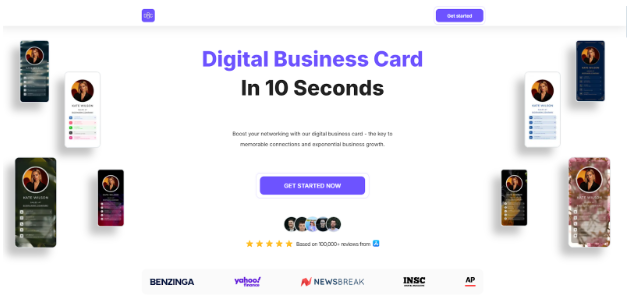
Digital Business Card (DBC) is a robust platform designed to replace traditional cards with sleek, interactive alternatives. Users can create fully customizable profiles with logos, images, videos, and social media links.
The platform supports NFC technology, allowing you to share contact details instantly by tapping a smartphone. Its blend of aesthetics and functionality makes it ideal for sales teams and professionals prioritizing data-driven networking.
Key Features:
- CRM integration (HubSpot, Salesforce) to track leads and follow-ups.
- Analytics dashboard to monitor card views and engagement.
- Team management tools for businesses to deploy branded cards at scale.
- Password protection for sensitive information.
3. HiHello
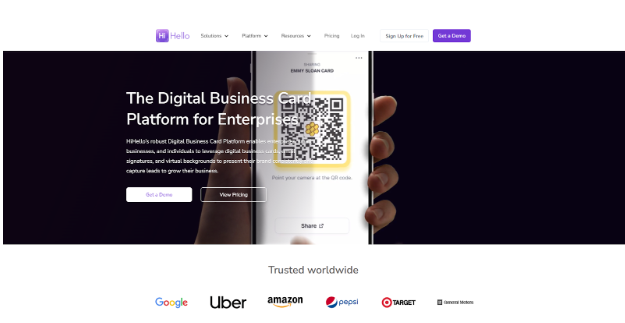
Another easy-to-use tool for making digital business cards is HiHello. Although there isn't a free plan, you can create one card for free (with restrictions).
HiHello stands out for its simplicity and generous free plan. The app lets you design multiple cards with customizable templates, colors, and fonts. Share your card via QR code, link, or NFC, and even add a digital signature for a personal touch.
HiHello’s intuitive interface and cost-effectiveness make it perfect for freelancers or startups dipping their toes into digital networking.
Key Features:
- Unlimited free cards with basic features.
- “Save to Contacts” button for seamless integration into recipients’ phones.
- Integration with tools like LinkedIn and Google Contacts.
- Professional tier ($6/month) adds analytics, team management, and custom domains.
4. Blinq
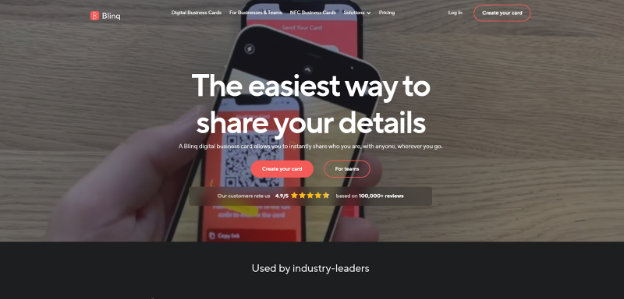
Blinq focuses on simplicity and real-time adaptability. Update your job title, contact info, or social links instantly—all existing shares automatically reflect changes.
Blinq’s emphasis on immediacy and collaboration suits growing teams and professionals in dynamic industries like tech or marketing.
Key Features:
- Unlimited cards on free and paid plans.
- Premium plans ($5.89/ month) with centralized branding controls.
- NFC and QR code sharing, plus printable QR stickers.
- Lightweight dashboard for tracking engagements.
5. wCard.io
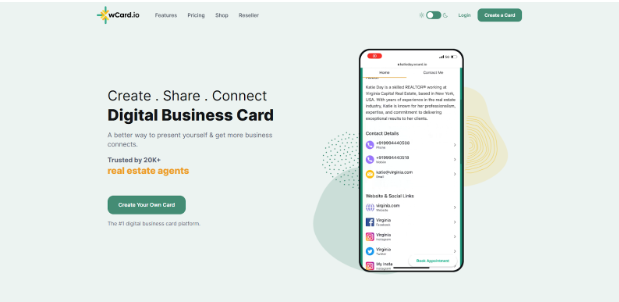
wCard.io combines sleek design with powerful AI-driven insights. Its cards support embedded calendars, appointment booking, and even e-commerce links. wcard.io is a standout for marketers who want to turn networking into actionable leads.
Key Features:
- AI analytics to track card performance and audience demographics.
- Custom domains and white-label options for businesses.
- Integration with Mailchimp and Zapier for automated workflows.
- Pricing starts at ₹199/month for 1 user.
6. Evrycard
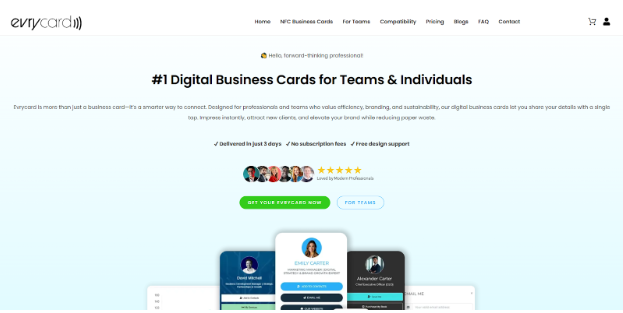
UK-based Evrycard offers a unique hybrid model: pair your digital card with a recycled NFC-enabled physical card. Tap the card on a phone to share your profile instantly.
Evrycard bridges the gap between digital convenience and tactile familiarity, ideal for travelers and sustainability advocates.
Key Features:
- Multi-language support for global professionals.
- Carbon-neutral certification for eco-friendly networking.
- Free digital card with physical NFC cards starting at £24.99.
- Customizable fields for certifications, portfolios, or menus (ideal for hospitality).
7. Mecard.me
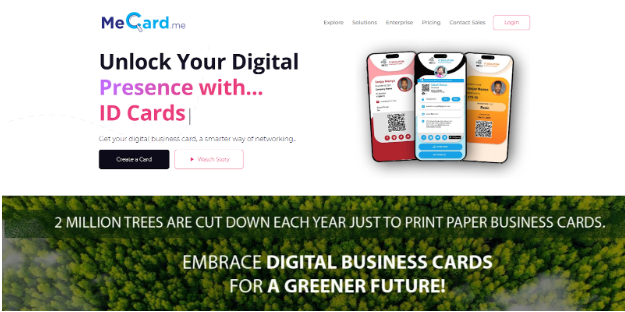
MeCard is a another digital business card platform made to cater to both individuals and businesses.
It combines a clean design with capabilities like customization, CRM connections, and real-time analytics, making it a perfect choice for professionals who want a balance of ease of use and functionality.
MeCard also supports multi-platform sharing, enabling users to share their cards via QR codes, NFC, or direct links.
Key Features :
- Share via QR code, NFC, or direct link.
- Track views, scans, and engagement metrics.
- Centralized control for businesses with multiple users.
- $10/year for features like QR Branding, and Business Card Scanner
8. MobiloCard
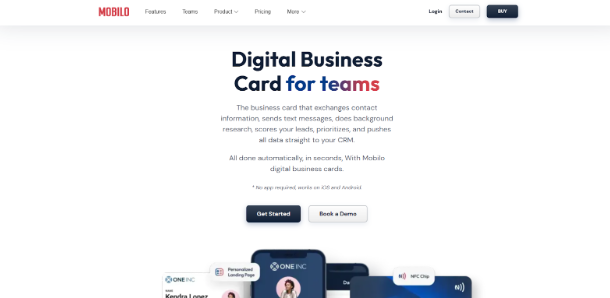
MobiloCard offers NFC-enabled digital cards paired with a mobile app for effortless sharing. Its standout feature is offline sharing—recipients can save your details without needing the app.
With its emphasis on scalability and premium hardware, MobiloCard is ideal for enterprises and executives. MobiloCard is designed for larger businesses and provides features like bulk card generation, role-based permissions, and smooth CRM syncing.
Key Features:
- Bulk card creation for large organizations.
- Advanced analytics with geographic heatmaps.
- Customizable NFC cards in metal, wood, or plastic.
- Pricing starts at $4.99 (One-time cost)
Conclusion
The shift to digital business cards isn’t just a trend—it’s a smarter, greener way to network. Whether you prioritize analytics (wcard.io), affordability (Zumvu’s Business Card), or hybrid solutions (Evrycard), there’s a platform tailored to your needs.
For teams, Zumvu and MobiloCard offer robust collaboration tools. Ready to ditch the paper? Try one (or more) of these platforms and watch your connections grow!
Pro Tip: Many platforms offer free trials or tiers—experiment to find the perfect fit before committing. Happy networking!

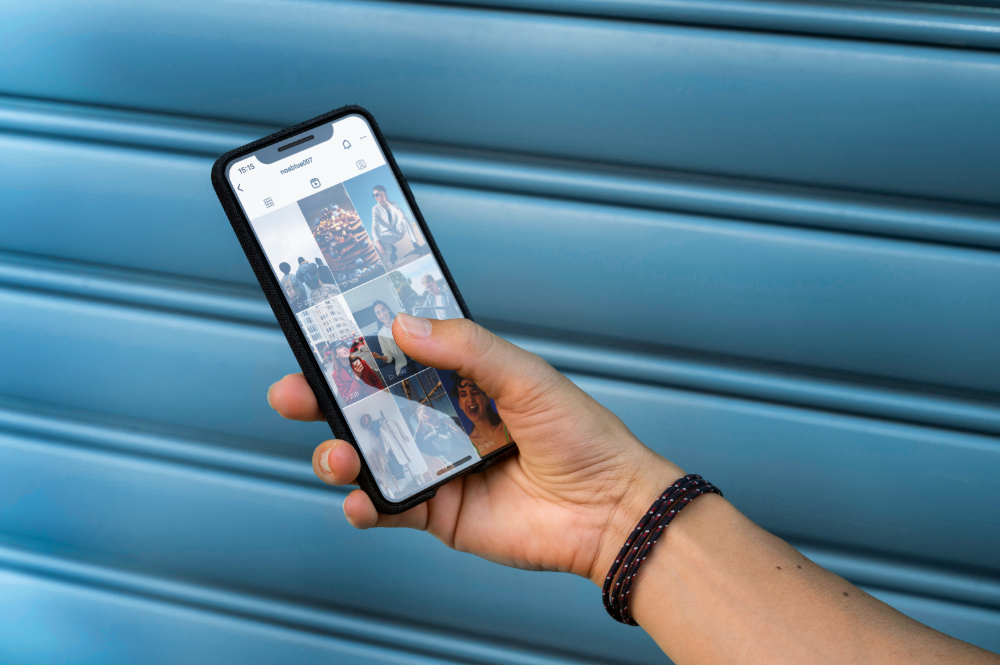
 Table of Content
Table of Content




